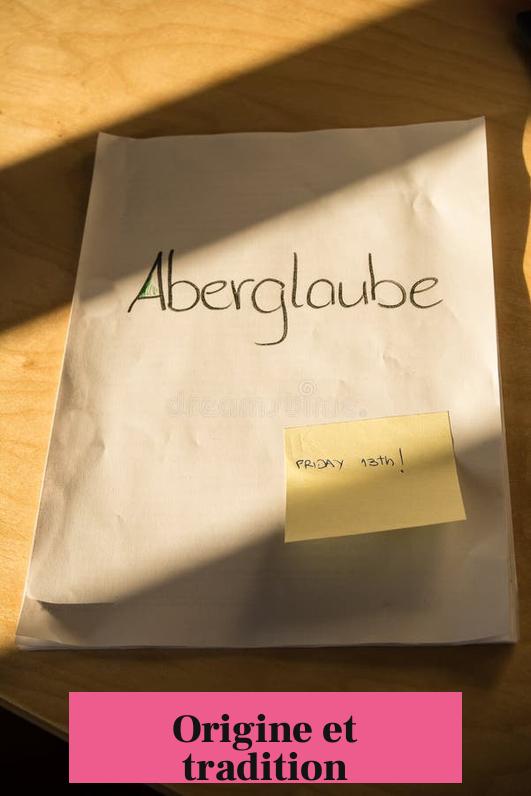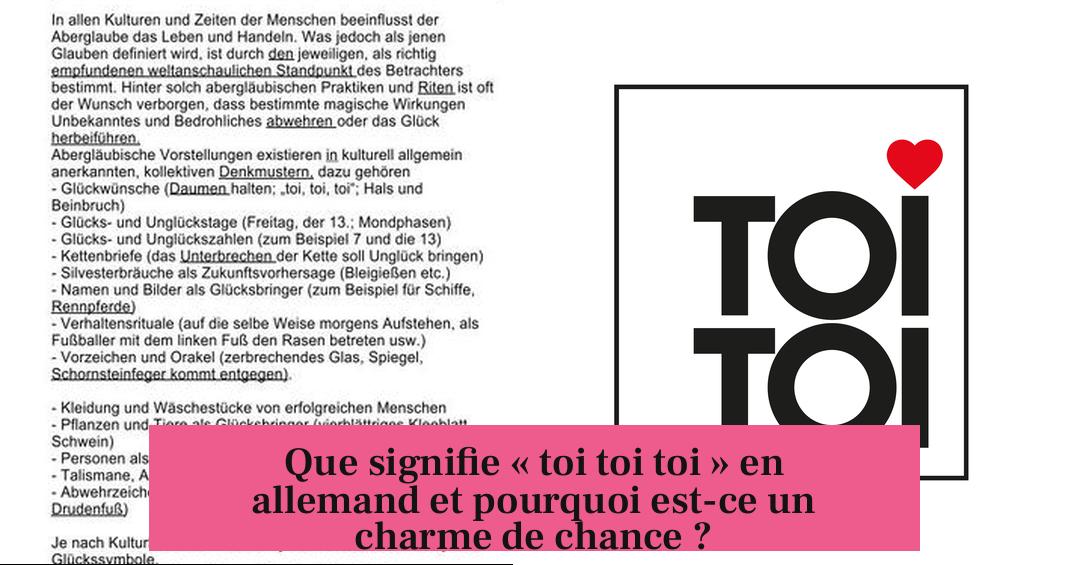Qu’est-ce que « toi toi toi » en allemand ?

« Toi toi toi » est une expression allemande utilisée pour souhaiter bonne chance. Elle imite le bruit du crachat et sert à conjurer le mauvais sort. Cette formule amusante accompagne souvent les artistes et les étudiants avant un événement important.
Signification et emploi
« Toi toi toi » se traduit littéralement par « bonne chance » ou « je te souhaite du succès ». On l’emploie pour encourager quelqu’un sans évoquer directement la chance, évitant ainsi l’infortune.
- Expression courante au théâtre, chez les musiciens ou avant un examen.
- Employée pour manifester du soutien ou de l’encouragement.
- Exemple typique :
A : J’ai un examen oral bientôt.B : Alors, toi, toi, toi !
Synonymes et expressions proches comprennent « Hals- und Beinbruch » (j’espère que tout ira bien) et « Ich drücke dir die Daumen » (je croise les doigts).
Origine et tradition

« Toi toi toi » dérive d’une ancienne coutume allemande qui consistait à cracher trois fois par-dessus l’épaule gauche. Ce rituel visait à chasser le diable ou les mauvais esprits pouvant causer malchance ou accidents.
Avec le temps, cracher en public est devenu impoli. Pour garder la tradition sans le geste, on a commencé à vocaliser le son du crachat : « toi toi toi » est une onomatopée qui imite ce bruit.
- Liens possibles avec le mot allemand « Teufel » (diable).
- Influence du mot yiddish « טוב » (tov), signifiant « bon ».
- Premiers témoignages écrits remontant au XIXe siècle.
La diffusion s’est renforcée grâce à des chansons populaires dans les années 1920-1930.
Croyances et coutumes associées
En allemand, souhaiter directement « bonne chance » peut être considéré comme porteur de malchance. C’est pourquoi des expressions codées comme « toi toi toi » sont privilégiées.
La superstition interdit aussi de répondre directement à un « toi toi toi » par des remerciements, car cela pourrait annuler la protection attendue.

La formule s’accompagne souvent d’un triple coup sur du bois, similaire à l’anglais « knock on wood », pour renforcer l’effet protecteur contre le mauvais œil et l’envie.
- Le geste de cracher est symbolique, visant à repousser les forces négatives.
- Le triple « toi » renforce la portée magique de l’expression.
- Autres variantes sonores : « Tü, tü, tü ».
Comparaison culturelle
Contrairement à « break a leg » en anglais, qui signifie « bonne chance » au théâtre, « toi toi toi » décrit plus spécifiquement un rituel de protection contre le malheur.
- « Hals- und Beinbruch » vient du yiddish, mais ne remplace pas directement « toi toi toi ».
- Le geste du crachat est moins agressif que certains superstitions étrangères.
- Le « tut tut tut » anglais exprime le désapprobation, sans rapport avec la chance.
Usage et contexte
« Toi toi toi » s’entend surtout dans les milieux artistiques germaniques : théâtre, opéra, musique classique.
Dans la vie quotidienne, il sert aussi à encourager avant un examen ou un défi important, mais il est moins connu en dehors de ces cercles.

À l’oral, l’expression se prononce souvent « Tü, tü, tü » pour imiter précisément le bruit du crachat.
Classification linguistique
« Toi toi toi » est une interjection familière, un emblème du langage de la scène germanophone.
Son usage formel est rare, et elle peut surprendre hors des cercles artistiques ou locaux.
Informations complémentaires
- Voir les entrées dans le Duden et Wiktionary pour précisions linguistiques.
- Présence dans la littérature allemande et chansons populaires du début XXe siècle.
- Un élément culturel attesté depuis le XIXe siècle.
Points clés à retenir

- « Toi toi toi » signifie « bonne chance » en allemand, associé à une imitation du crachat.
- C’est un rituel ancien visant à effrayer les mauvais esprits et conjurer la malchance.
- Souhaiter directement « bonne chance » est évité pour ne pas attirer la malchance.
- Expression d’usage courant dans le théâtre et la musique allemands.
- Elle s’accompagne souvent d’un triple coup sur du bois pour renforcer la protection.
- Peut être prononcée « Tü, tü, tü » pour reproduire le bruit du crachat.
- Ne pas répondre directement à un « toi toi toi » pour ne pas briser le sort.
What Is Toi Toi Toi in German? Unraveling a Quirky Luck Charm
Toi toi toi—What does it mean? In German culture, this phrase is a charming way to say “good luck.” But it’s not just words; it’s an onomatopoeic echo of spitting sounds. Yes, you read that right. It’s a playful vocal imitation rooted deep in superstition and tradition. Intrigued? Let’s dive into the fascinating world of toi toi toi and see why Germans utter it before performances, exams, or any challenge.
Toi Toi Toi: Meaning and Everyday Use
At first glance, toi toi toi might sound like gibberish, but it is anything but. In Germany, saying toi toi toi is like sending good luck vibes across the room. It approximately means “I wish you luck” or “Hopefully, it will go well.” It’s popular among actors, musicians, and students gearing up for exams.
A typical scene: A: “Ich habe gleich mündliche Prüfung!” B: “Na dann mal toi, toi, toi.” (Good luck then!)
This quirky phrase often shares company with other similar phrases: Hals- und Beinbruch (break a leg), Ich drücke Dir die Daumen (I’m keeping my fingers crossed), and even the English knock on wood. But toi toi toi kicks off its own cultural charm.

Spitting Over the Shoulder? That’s the Origin Story!
The roots of toi toi toi dig into an old folk belief: spitting three times over the left shoulder to ward off the devil or evil spirits. This practice isn’t unique to Germany but is part of a wider European tradition.
Back in the 18th century, spitting in public became frowned upon—rude, even. So clever German speakers replaced the actual act with a sound effect that mimicked spitting. This onomatopoeic charm toi toi toi ensures the superstition remains alive but politely so.
Some linguists suggest that the phrase also nods to the word “Teufel” (devil) and possibly the Hebrew-Jiddish “טוב” (tov), meaning “good.” It’s a fascinating mashup: superstition meets linguistic creativity in one three-syllable expression.
The Aberglaube (Superstition) Behind Toi Toi Toi
In many cultures, directly wishing someone “good luck” is thought to bring bad luck instead. Germans aren’t different; using toi toi toi or knocking on wood serves as a protective charm against envy or the “evil eye.”
The ritual involves mimicking spitting sounds or softly saying “tü, tü, tü” three times over the shoulder. Sometimes, people logically add knocking on wood. The trio of gestures is like a mini good luck spell.
Interestingly, if you say “thank you” after receiving toi toi toi, it might spoil the magic! Instead, it’s better to accept the good luck wish quietly and keep fingers crossed.
Where Do People Use Toi Toi Toi?
The phrase finds a cozy spot mostly in the entertainment world—actors, opera singers, and musicians toss it around like a proverbial lucky coin. But it’s not just showbiz. Students facing oral exams or anyone about to tackle a challenge are fair game for toi toi toi.
That said, if you drop toi toi toi at a corporate meeting, expect puzzled looks! The expression thrives in the arts and music scene more than elsewhere.
How Is Toi Toi Toi Different From Other Luck Expressions?
| Expression | Meaning | Context/Notes |
|---|---|---|
| Toi toi toi | Good luck, warding off evil | Theater, exams, music; imitates spitting |
| Hals- und Beinbruch | Break a leg (good luck) | Originates from Yiddish; used broadly |
| Break a leg | Good luck (esp. theater) | English idiom; ironic wish |
| Knock on wood | Good luck, prevent bad luck | English variant; wood symbolizes protection |
Notice how “tut tut tut” in English signals disapproval, not luck. A reminder that sounds can have wildly different meanings depending on language and culture.
Language Classification and How Germans See Toi Toi Toi
Grammatically, toi toi toi counts as an interjection—an informal, spoken expression. Think of it as a verbal emoji used mostly in German-speaking theatrical and musical circles. It’s not a word you’d normally find scribbled in official documents or academic papers.
Outside of these artsy spheres, people might scratch their heads hearing it for the first time. It’s a reminder that some cultural gems hide behind the curtain of specialized contexts.
Want to Dive Deeper?
Curious minds can check out the entries for toi toi toi in Duden or Wiktionary. These lexicons document its usage since the 19th century and detail its journey through German-speaking culture.
Also, listen closely to songs or theatre plays from the 1920s and ’30s—numerous tunes popularized it, making it stick around for generations. It’s fascinating to witness how a simple superstition merges into language and art.
So, What’s the Takeaway?
“Toi toi toi” is more than just words. It’s a quirky, onomatopoeic superstition-rooted phrase Germans use to wish good luck without tempting fate. It imitates spitting sounds from an old custom aiming to protect against evil, survives today primarily in theater and music circles, and adds a splash of cultural fun to any challenge.
Next time you or a German friend is nervous about a test, a performance, or a meeting, try saying “toi toi toi.” It might just bring a bit of that old magic—as long as you resist the urge to say thank you directly. After all, superstition loves a little mystery!
Qu’est-ce que “toi toi toi” signifie en allemand ?
“Toi toi toi” est une expression pour souhaiter bonne chance. Elle imite le bruit du crachat, utilisé pour éloigner le mal.
Quelle est l’origine de “toi toi toi” en Allemagne ?
Cette expression vient d’une vieille tradition où l’on crachait trois fois par-dessus l’épaule pour chasser les mauvais esprits.
Dans quels contextes utilise-t-on “toi toi toi” ?
Principalement au théâtre, en musique ou avant des examens pour encourager quelqu’un et lui porter chance.
Pourquoi ne doit-on pas répondre directement à un “toi toi toi” ?
Dire merci ou confirmer pourrait porter malheur, car l’expression vise à éviter le mauvais sort et l’envie.
Comment “toi toi toi” se compare-t-il à l’expression anglaise “break a leg” ?
“Toi toi toi” est une onomatopée liée à un ancien rituel anti-sorcellerie, tandis que “break a leg” est une expression idiomatique de théâtre.
Y a-t-il des expressions similaires en allemand ?
Oui, par exemple “Hals- und Beinbruch”, qui signifie aussi bonne chance, mais “toi toi toi” est plus associé à la superstition.

